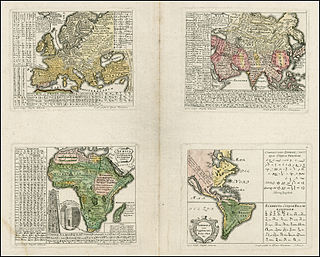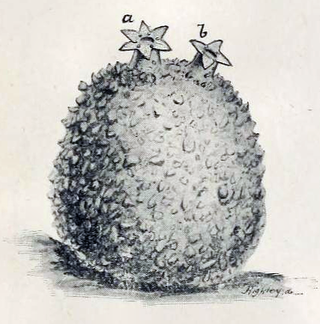
Heinrich Cornelius Agrippa von Nettesheim was a German Renaissance polymath, physician, legal scholar, soldier, theologian, and occult writer. Agrippa's Three Books of Occult Philosophy published in 1533 drew heavily upon Kabbalah, Hermeticism, and neo-Platonism. His book was widely influential among esotericists of the early modern period, and was condemned as heretical by the inquisitor of Cologne.

Three Books of Occult Philosophy is Heinrich Cornelius Agrippa's study of occult philosophy, acknowledged as a significant contribution to the Renaissance philosophical discussion concerning the powers of magic, and its relationship with religion. The first book was printed in 1531 in Paris, Cologne, and Antwerp, while the full three volumes first appeared in Cologne in 1533.
The congenital absence of the gluteal muscle was described in 1976, as occurring in a brother and sister with absence of gluteal muscles and with spina bifida occulta. It was thought to be caused by an autosomal recessive gene.

A silique or siliqua is a type of fruit having two fused carpels with the length being more than three times the width. When the length is less than three times the width of the dried fruit it is referred to as a silicle. The outer walls of the ovary usually separate when ripe, then being named dehiscent, and leaving a persistent partition. Siliques are present in many members of the mustard family, Brassicaceae, but some species have silicles instead. Some species closely related to plants with true siliques have fruits with a similar structure that do not open when ripe; these are usually called indehiscent siliques.

At the Heart of Winter is the fifth studio album by Norwegian black metal band Immortal. It was released on February 22, 1999 through Osmose Productions. It is the first Immortal album not to feature Demonaz on guitar, as he suffered from acute tendinitis in his hands, as well as the last album until Sons of Northern Darkness to feature Abbath on bass. The album marks a shift in Immortal's musical sound, towards a black metal and thrash metal fusion.

Blizzard Beasts is the fourth studio album by Norwegian black metal band Immortal. It was released on March 20, 1997, through Osmose Productions. It is the last Immortal album to feature the performance of founding member Demonaz Doom Occulta until Northern Chaos Gods (2018) and the first to feature Horgh on drums. Demonaz was later diagnosed with acute tendinitis which prevented him from playing guitar at the required speed for Immortal's music. Stylistically, Blizzard Beasts has primarily songs that are less than three minutes long, contrasting with Immortal's usual longer song lengths.

Nemichandra, also known by his epithet Siddhanta Chakravarty, was a Jain acharya from present-day India. He wrote several works including Dravyasamgraha, Gommatsāra, Trilokasara, Labdhisara and Kshapanasara.

Transitus Fluvii or Passage Du Fleuve is an occult alphabet consisting of 22 characters described by Heinrich Cornelius Agrippa in his Third Book of Occult Philosophy. It is derived from the Hebrew alphabet and is similar to the Celestial and Malachim alphabets. The name may refer to the crossing of the Euphrates by the Jews on their return from Babylon to rebuild the Temple.

Pedicia is a genus of hairy-eyed craneflies.

Pedicia rivosa is a species of hairy-eyed cranefly in the family Pediciidae. It is found across most of Europe, but excluding the Iberian Peninsula. The subspecies P. r. mannheimsi is found in France and Germany, and some specimens from Scotland may also belong to this subspecies.

Synopsis Universae Philologiae is an early work on comparative linguistics by Gottfried Hensel, a rector in Hirschberg, Lower Silesia. Its full title reads: Synopsis universae philologiae: in qua: miranda unitas et harmonia linguarum totius orbis terrarum occulta, e literarum, syllabarum, vocumque natura & recessibus eruitur. Cum Grammatica, LL. Orient. Harmonica, Synoptice tractata; nec non descriptione Orbis Terr. quoad Linguarum situm & propagationem, mappisque geographico-polyglottis. It was published in 1741 in Nuremberg by commission of the Homann heirs company. A second edition appeared in 1754.

Molgula oculata, commonly known as the sea grape, is a species of solitary tunicate in the family Molgulidae. It is native to the north eastern Atlantic Ocean and the North Sea. The specific name oculata means "having eyes"; the species has orifices which "seem like dark eyes within a spectacle-formed frame".
Molgula occulta is a species of solitary tunicate in the family Molgulidae. It is native to the north eastern Atlantic Ocean, the North Sea and the Mediterranean Sea. The specific name occulta means "tailless" and refers to the tunicate's larva, which lacks the tail found in some other species in the genus Molgula.
Gaiella occulta is a rod-shaped and non-motile bacterium from the genus of Gaiella which has been isolated from deep mineral water in Portugal.
Hydrochara occulta is a species of water scavenger beetle in the family Hydrophilidae. It is found in North America.
Pedicia parvicellula is a species of hairy-eyed crane fly in the family Pediciidae.
Pedicia contermina is a species of hairy-eyed crane fly in the family Pediciidae.
Pedicia inconstans is a species of hairy-eyed crane fly in the family Pediciidae.
Pedicia procteriana is a species of hairy-eyed crane fly in the family Pediciidae.











